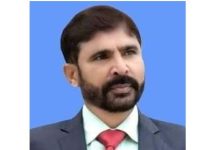F Z Khan
Though the first round of Afghan presidential election has not shown a clear winner as yet – all eyes are now on the second round of the election, scheduled to be held on June 7; and it has to be seen whether Abdullah Abdullah manages to secure a clear mandate or Ashraf Ghani emerges successful – yet the world has witnessed a dramatic change as about 60 percent Afghans, one-third of them being women, turned up at the polling stations, which seemed impossible amidst threats from the Taliban and security alerts from the law enforcers. Besides the political maturity on politicians as well as the masses level, it shows more of the people’s thirst for a stable and peaceful Afghanistan that has seen decades of turmoil and bloodshed in the past.No matter the challenges for new president will be huge, it would however be easy for him to act in unison towards garnering peace and building stable Afghanistan, provided he fully understands the changing dynamics with reference to the change of heart in Islamabad. In the words of Sartaj Aziz, the advisor to PM on foreign affairs, “Pakistan has buried the defence-in-depth doctrine, abandoned its pro-Taliban mindset and has repeatedly announced it doesn’t have any favourite in the Afghan politics.” This certainly conveys a message to the likely winner, who has been endorsing the Karzai regime’s claim that the internal turmoil of Afghanistan has been the “consequence of Pakistan’s support of Afghan Taliban.” It has been rather the other way round as, according to NYT, the Kabul regime has openly admitted to Washington that it supports the TTP’s war against the state of Pakistan.
Across Pakistan’s eastern border a similar change has taken place as Modi has sworn in the Indian election by heavily bagging the majority mandate. Though Prime Minister Nawaz Sharif has rightly participated in Modi’s swearing in ceremony and the positives have certainly been exchanged, yet the coming months would determine as to what attitude India prefers to show in response to Premier Nawaz’s optimism. Most of the observers do not however see it as a positive development and therefore pin no hope at all with both Abdullah Abdullah of Afghanistan and Narendra Modi of India. At some point this change on eastern and western borders does not seem to be a mere coincidence but a well thought out ploy that does not go in favour of Pakistan. The unusually huge and highly intriguing gathering of Hizbut Tehrir outside Al-Aqsa Mosque in Jerusalem, Israel, where not even a Palestinian child is allowed by Tel Aviv to visit, the full throat demand of mysterious HT calling “strong” Pakistan army to come and rescue the Muslims and liberate Jerusalem rings alarm bells against Pakistan and its armed forces. At the same time it sounds to indicate towards the impeding threat to Pakistan’s very existence.
The new leaderships in both Afghanistan and India have to understand Islamabad’s growing concerns whether to shun the policy of supporting anti-Pakistan Taliban, providing terrorists safe havens in Kunar, Nuristan or elsewhere, running training camps with the help of Indian consulates, and facilitating the BLA in fomenting unrest in Balochistan or joining hands together to give the region and future generations a solid ground for building peace, prosperity and uplift. “O ghaafil Afghan!” is the heartfelt voice of Allama Iqbal, who gave not only the concept of Pakistan but also conceived the concept of bringing nations together from “Niles (of Egypt) to Kasghar (of CARs)”. Pakistan provides the bridge between – an opportunity that knocks our doors to avail it now or someone else will. Pakistan offers corridor from Gawadar to Karachi up to Central Asian states via Torkham, Chaman and tens of gates entering Afghanistan. Therefore, the idea of fomenting unrest by using media or funding the disgruntled elements would only result in weakening the coordinating links. Such elements on their part in general and media in particular, must realize that once the unity of the nation is shaken, it would push the entire region into an unending misfortune. The Chief of Army Staff, in his April 30 Yaum-e-Shuhada speech minced no words in showing Pakistan army’s “commitment to the democratic setup in the country, need for a constructive engagement with the Taliban, appreciable contribution of media and civil society to help enlarge masses’ role in nation-building and country’s relations with its neighbours”, but at the same time he gave a clear message of peaceful coexistence, showing responsibility and positivity, and not compromising dignity and honour of the nation whatever the cost maybe. Kashmir is the “jugular vein of Pakistan”, he said following the Quaid’s slogan, adding nothing short of resolution of Kashmir in accordance with the aspirations of Kashmiri people and the UN Security Council resolutions should be accepted. His words “internal war or external, nations fight” infused a spirit of trust and sense of security. The undeclared retaliatory operation in the troubled areas on our western front and the ensuing split in the Taliban tehrik are a healthy sign that may lead the nation towards uniting its ranks. The section of media has promised in its published apology to play its part of role positively and take care of the overall interest of the nation. It is now incumbent upon the government, and the security establishment including the armed forces and intelligence agencies to let bury the hatchet and guide towards achieving future goals. The talk of taking over must come to end, once and for all. Together we have to face the challenges, the bigger challenge is seemingly in the pipeline.
(F Z Khan is a security analyst and freelance columnist. He can be reached at [email protected])











